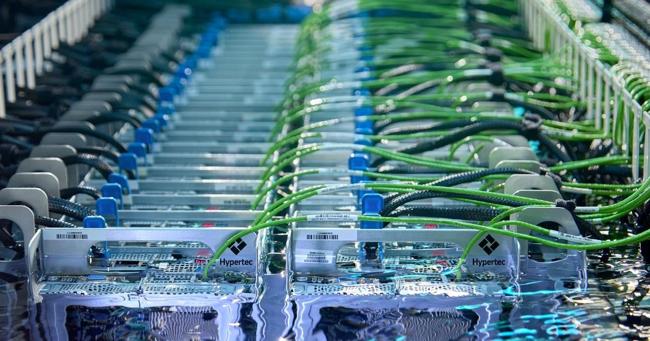Summary
AI cloud company AI Green Bytes is building an immersion-cooled data center in Paris, France, which will utilize plant-based cooling fluid developed by Oleon. By submerging its servers in Oleons coolant, known as Qloe, AI Green Bytes claims it can cut energy use by up to 90 percent when compared to air-cooled systems.
Source: DatacenterDynamics

AI News Q&A (Free Content)
Q1: What are the primary benefits of using plant-based immersion cooling fluid in data centers compared to traditional air cooling?
A1: Plant-based immersion cooling fluid, such as Oleon's Qloe, offers several advantages over traditional air cooling systems in data centers. It significantly reduces energy consumption by up to 90% and allows for higher power densities. The immersion cooling process involves submerging servers in the cooling fluid, which has a higher heat capacity than air, effectively dissipating heat more efficiently. This method not only lowers energy costs but also reduces the physical space required for cooling equipment.
Q2: How does the use of immersion cooling technology impact the environmental sustainability of data centers?
A2: Immersion cooling technology enhances the environmental sustainability of data centers by reducing the overall energy consumption and carbon footprint. This method allows for more efficient heat management, leading to less waste heat being expelled into the environment. Furthermore, the use of plant-based fluids, like Oleon's Qloe, aligns with eco-friendly practices by utilizing renewable resources instead of synthetic chemicals, thus lowering environmental impact.
Q3: What are some challenges associated with retrofitting existing data centers with immersion cooling systems?
A3: Retrofitting existing data centers with immersion cooling systems presents several challenges. It involves significant capital investment and operational changes. The existing infrastructure may not be compatible with immersion cooling setups, requiring substantial modifications. Maintenance can also become more complex, and there may be increased reliability concerns due to the new cooling method. Despite these challenges, the potential energy savings and efficiency gains can make it a worthwhile investment for future-proofing data centers.
Q4: What does recent research say about the role of immersion cooling in enhancing data center energy efficiency?
A4: Recent research highlights that immersion cooling can substantially enhance data center energy efficiency. Studies have shown that immersion cooling can halve energy consumption compared to air cooling, due to its superior heat transfer capabilities. This is achieved by directly submerging electronic components in cooling liquids, which absorb and dissipate heat more effectively than air. The higher heat capacity of these liquids allows for greater power densities and reduced space requirements, promoting more sustainable and efficient operations.
Q5: How does the integration of plant-based cooling fluids in data centers align with the broader trend of sustainable technology practices?
A5: Integrating plant-based cooling fluids in data centers aligns with the broader trend of sustainable technology practices by promoting the use of renewable resources and reducing reliance on fossil fuels. This approach not only supports energy efficiency but also reduces the ecological footprint of data centers. By opting for biodegradable and non-toxic cooling solutions, companies contribute to a more sustainable tech ecosystem, which is increasingly important as data centers become more prevalent worldwide.
Q6: What are the economic implications of switching to plant-based immersion cooling in data centers?
A6: Switching to plant-based immersion cooling in data centers can lead to significant economic benefits. The primary advantage is the reduction in energy costs, as this method can decrease energy consumption by up to 90% compared to traditional systems. Although the initial investment for installation and retrofitting can be high, the long-term savings in operational costs, alongside increased efficiency and reduced space requirements, can provide a favorable return on investment. Additionally, the use of plant-based fluids may offer cost savings by avoiding the expenses associated with synthetic chemicals.
Q7: Can you explain the scientific basis for enhanced thermal conductivity in plant-based immersion cooling fluids used in data centers?
A7: The enhanced thermal conductivity of plant-based immersion cooling fluids, such as those used by Oleon, is primarily due to their high specific heat capacity and superior thermal properties compared to air. These fluids can absorb and transfer heat more efficiently, allowing servers to operate at higher power densities without overheating. Research on nanofluid dynamics suggests that the presence of a nanolayer at the fluid-solid interface enhances thermal conductivity, facilitating better heat dissipation and improving the cooling efficiency of data centers.
References:
- Runtime data center temperature prediction using Grammatical Evolution techniques
- Enough Hot Air: The Role of Immersion Cooling
- Sustainable Edge Computing: Challenges and Future Directions





